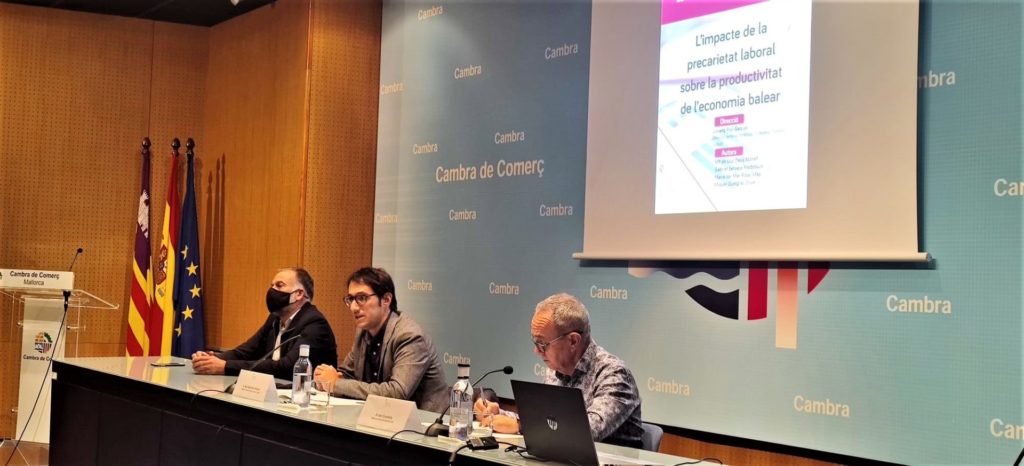
Presentation of the report on job insecurity in the Balearic Islands. Photo: GOIB.
A study by the General Directorate of Economic Model and Employment, collected in the publication “Cuadernos de Economía”, indicates that temporality and partiality cause a loss in the productivity of the Balearic Islands, to the point that precariousness not only affects the whole of workers, but also to the accounts of the companies. In quantitative terms, the loss of GDP caused by precariousness is estimated at 1,303 million euros.
The conclusions of this study, led by the Director General of the Economic Model and Employment, Llorenç Pou, shows that the temporary employment rate was 27% in the islands in 2019, a higher percentage than in Spain (26, 3%) and well above the European average (13.6%). On the contrary, the partiality rate of the Balearic Islands stood at 12.7% in 2019, below the national average (14.5%) and the European average (19.1%).
The statistical analysis determines that there is a direct relationship between the rate of temporary employment and partiality and productivity, in such a way that for each percentage point of temporary employment to companies, their productivity is reduced by an average of 0.21 percentage points, and for each percentage point of bias, productivity falls another 0.17%.
The simulation carried out by the General Directorate of Economic Model shows that if the temporary employment rate were brought back to the EU levels of 2019, the Balearic Islands would reduce the temporary employment rate to 13.4%, which would mean an increase in GDP of 2.9% ; In the case of involuntary partiality, which computes 5.7 percentage points, if the Islands were to eliminate it then GDP could increase another 1%.
In this way, the global impact of the Balearic GDP could increase up to 3.9%, which in monetary terms would amount to more than 1,303 million euros in the year.
In this theoretical context, the work shows that the labor organization does condition the productivity of the companies and, thus, the level of GDP of each territory, and better management in terms of quality employment (higher level of permanent hiring and suppression of partiality) benefits both the business organization as well as the workers as a whole, and would facilitate positive dynamic effects for both parties.
The analysis has been presented by the Minister of Economic Model, Tourism and Labor, Iago Negueruela, in the framework of a conference given by Joan Coscubiela, director of the CCOO School of Work and a person very involved in the defense of the rights of the workers, who in 2009 made him worthy of the Cross of Saint George.







Leave A Comment